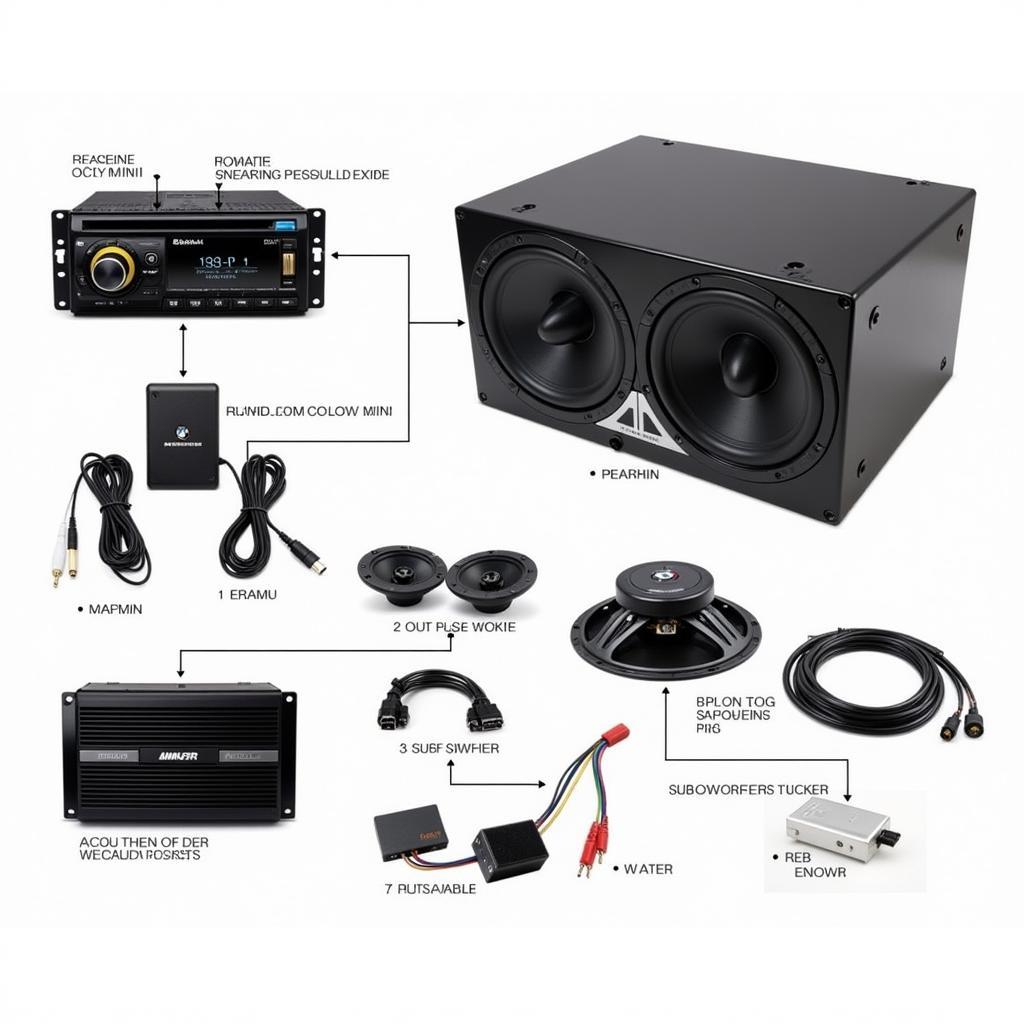The distinct BMW M70 sound is a symphony of power and precision, a hallmark of BMW’s engineering prowess. This article explores the intricacies of this legendary V12 engine, delving into its unique acoustic signature, common issues, and potential solutions. We’ll uncover the secrets behind the M70’s captivating roar, providing valuable insights for owners, mechanics, and automotive enthusiasts alike.
The BMW M70 engine, a 5.0-liter V12, first graced the BMW 750i and 850i in the late 1980s. Its smooth power delivery and distinctive sound quickly became synonymous with luxury and performance. But what creates that iconic BMW M70 sound? It’s a complex interplay of factors, from the engine’s firing order and exhaust system design to the very materials used in its construction. The twelve cylinders work in harmony, producing a refined yet powerful exhaust note that is instantly recognizable.
Deconstructing the BMW M70’s Acoustic Signature
The M70’s unique sound is a product of its V12 configuration. The even firing intervals create a smooth, almost turbine-like sound at idle, which transforms into a deep, resonant growl under acceleration. This is further enhanced by the carefully tuned exhaust system, designed to amplify the engine’s natural harmonics while minimizing unwanted noise. The engine’s robust construction, featuring a cast-iron block and aluminum heads, also contributes to its sonic character. This combination of materials helps dampen unwanted vibrations, resulting in a cleaner, more refined sound.
Similar to the bmw v16 engine sound, the M70’s sound is a carefully orchestrated symphony of mechanical precision. Understanding the various components contributing to this unique sound is key to diagnosing and addressing potential issues.
Common Issues Affecting the BMW M70 Sound
While the M70 is a robust engine, it’s not immune to issues that can impact its sound. One common problem is exhaust leaks. These can manifest as a hissing or ticking sound, disrupting the engine’s smooth, refined note. Another potential culprit is worn-out timing chain guides, which can create a rattling noise, particularly at idle. Additionally, issues with the valvetrain, such as worn lifters or rocker arms, can introduce a tapping or clicking sound.
“Regular maintenance is crucial for preserving the M70’s unique sound,” advises renowned BMW specialist, Dr. Hans Zimmerman. “Addressing issues promptly can prevent further damage and ensure the engine continues to perform at its best.”
Troubleshooting and Solutions for BMW M70 Sound Problems
Diagnosing sound-related issues with the M70 requires a systematic approach. A thorough inspection of the exhaust system is the first step, looking for cracks, loose connections, or damaged components. Next, the timing chain guides should be checked for wear and tear. Finally, a careful listening with a stethoscope can help pinpoint valvetrain issues.
Solutions range from simple repairs, like replacing a faulty gasket, to more complex procedures, such as overhauling the valvetrain. For exhaust leaks, welding or replacing damaged sections is often necessary. Timing chain guide replacement requires specialized tools and expertise. Valvetrain repairs may involve replacing lifters, rocker arms, or even the camshafts.
This process shares similarities with the bmw 850i v12 sound troubleshooting, emphasizing the importance of precise diagnosis and repair for these complex V12 engines.
Maintaining the Legendary Sound
Preserving the iconic BMW M70 sound requires diligent maintenance. Regular oil changes with high-quality oil are essential for lubricating the engine’s intricate components and preventing premature wear. Furthermore, using the correct fuel type and ensuring the engine is running at the proper operating temperature can help maintain its performance and acoustic signature. Regular inspections by a qualified BMW technician are also crucial for identifying and addressing potential issues before they escalate.
“The M70 is a masterpiece of engineering,” says leading automotive engineer, Ms. Anya Petrova. “Proper care ensures its legendary sound continues to resonate for years to come.”
In conclusion, the BMW M70 sound is a testament to BMW’s commitment to performance and refinement. Understanding the intricacies of this iconic engine, from its design to its potential issues, is crucial for preserving its legendary acoustic signature. By addressing problems promptly and following a diligent maintenance schedule, owners can ensure their M70 continues to deliver its signature symphony of power for years to come.
FAQ
- What makes the BMW M70 sound unique? The V12 configuration, firing order, and exhaust system design contribute to its distinctive sound.
- What are some common M70 sound-related issues? Exhaust leaks, worn timing chain guides, and valvetrain problems can affect the sound.
- How can I troubleshoot M70 sound problems? Inspect the exhaust system, check the timing chain guides, and listen for valvetrain issues.
- How can I maintain the M70’s sound? Regular oil changes, correct fuel type, and proper operating temperature are essential.
- Where can I find a qualified BMW M70 technician? Consult your local BMW dealership or search for specialized BMW repair shops.
- What is the typical lifespan of an M70 engine? With proper maintenance, the M70 can last for several hundred thousand miles.
- Are parts for the M70 readily available? While some parts may be more challenging to find than others, they are generally available through BMW dealerships and specialized suppliers.
For those interested in comparing V12 engine sounds, you can explore the v12 sound bmw for further insights. Also, if you’re curious about another unique engine sound, check out the bmw 767il v16 sound.
Need assistance with your BMW M70? Contact us via Whatsapp: +1 (641) 206-8880, Email: CARDIAGTECH[email protected] or visit us at 276 Reock St, City of Orange, NJ 07050, United States. Our team is available 24/7 to assist you.

